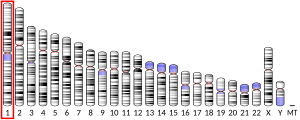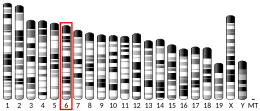Interleukin-23 receptor
The interleukin-23 receptor is a type I cytokine receptor. It is encoded in human by the IL23R gene.[5] In complex with the interleukin-12 receptor β1 subunit (IL-12Rβ1), it is activated by the cytokine interleukin 23 (IL-23).[6] The IL23R mRNA is 2.8 kilobases in length and includes 12 exons. The translated protein contains 629 amino acids; it is a type I penetrating protein and includes a signal peptide, an N-terminal fibronectin III-like domain and an intracellular part that contains three potential tyrosine phosphorylation domains.[6] There are 24 IL23R splice variants in mitogen-activated lymphocytes.[7] IL23R includes some single-nucleotide polymorphisms in the region encoding the domain that binds IL-23, which may lead to differences between people in Th17 activation.[8] There is also a variant of IL-23R that consists of just the extracellular part and is known as soluble IL-23R. This form can compete with the membrane-bound form to bind IL-23, modulating the Th17 immune response and regulation of inflammation and immune function.[9]
Function
[edit]The protein encoded by this gene is a subunit of the receptor for IL-23. This protein pairs with the receptor molecule IL-12Rβ1 (IL12RB1), together forming the IL-23 receptor complex, and both are required for IL-23 signaling. This protein associates constitutively with Janus kinase 2 (JAK2) and also binds to transcription activator STAT3 in a ligand-dependent manner.[5]
Clinical significance
[edit]Three variants in the IL23R gene have been shown to protect against Crohn's disease and ulcerative colitis.[10][11][12] The effect of IL-23R variations present in the population have been studied with an in vitro expression model system.[13]
References
[edit]- ^ a b c GRCh38: Ensembl release 89: ENSG00000162594 – Ensembl, May 2017
- ^ a b c GRCm38: Ensembl release 89: ENSMUSG00000049093 – Ensembl, May 2017
- ^ "Human PubMed Reference:". National Center for Biotechnology Information, U.S. National Library of Medicine.
- ^ "Mouse PubMed Reference:". National Center for Biotechnology Information, U.S. National Library of Medicine.
- ^ a b "Entrez Gene: IL23R interleukin 23 receptor".
- ^ a b Parham C, Chirica M, Timans J, Vaisberg E, Travis M, Cheung J, et al. (June 2002). "A receptor for the heterodimeric cytokine IL-23 is composed of IL-12Rbeta1 and a novel cytokine receptor subunit, IL-23R". Journal of Immunology. 168 (11): 5699–708. doi:10.4049/jimmunol.168.11.5699. PMID 12023369.
- ^ Kan SH, Mancini G, Gallagher G (October 2008). "Identification and characterization of multiple splice forms of the human interleukin-23 receptor alpha chain in mitogen-activated leukocytes". Genes and Immunity. 9 (7): 631–9. doi:10.1038/gene.2008.64. PMID 18754016.
- ^ Yu RY, Brazaitis J, Gallagher G (February 2015). "The human IL-23 receptor rs11209026 A allele promotes the expression of a soluble IL-23R-encoding mRNA species". Journal of Immunology. 194 (3): 1062–8. doi:10.4049/jimmunol.1401850. PMID 25552541.
- ^ "Figure 8. with two source data miR-34a regulates Th17 cell-mediated proliferation". doi:10.7554/elife.39479.025.
{{cite journal}}: Cite journal requires|journal=(help) - ^ Duerr RH, Taylor KD, Brant SR, Rioux JD, Silverberg MS, Daly MJ, et al. (Dec 2006). "A genome-wide association study identifies IL23R as an inflammatory bowel disease gene". Science. 314 (5804): 1461–3. Bibcode:2006Sci...314.1461D. doi:10.1126/science.1135245. PMC 4410764. PMID 17068223.
- ^ Rivas MA, Beaudoin M, Gardet A, Stevens C, Sharma Y, Zhang CK, et al. (Nov 2011). "Deep resequencing of GWAS loci identifies independent rare variants associated with inflammatory bowel disease". Nature Genetics. 43 (11): 1066–73. doi:10.1038/ng.952. PMC 3378381. PMID 21983784.
- ^ Momozawa Y, Mni M, Nakamura K, Coppieters W, Almer S, Amininejad L, et al. (Jan 2011). "Resequencing of positional candidates identifies low frequency IL23R coding variants protecting against inflammatory bowel disease". Nature Genetics. 43 (1): 43–7. doi:10.1038/ng.733. hdl:1854/LU-1145381. PMID 21151126. S2CID 21340871.
- ^ de Paus RA, van de Wetering D, van Dissel JT, van de Vosse E (September 2008). "IL-23 and IL-12 responses in activated human T cells retrovirally transduced with IL-23 receptor variants". Molecular Immunology. 45 (15): 3889–95. doi:10.1016/j.molimm.2008.06.029. PMID 18675459.
Further reading
[edit]- Parham C, Chirica M, Timans J, Vaisberg E, Travis M, Cheung J, Pflanz S, Zhang R, Singh KP, Vega F, To W, Wagner J, O'Farrell AM, McClanahan T, Zurawski S, Hannum C, Gorman D, Rennick DM, Kastelein RA, de Waal Malefyt R, Moore KW (Jun 2002). "A receptor for the heterodimeric cytokine IL-23 is composed of IL-12Rbeta1 and a novel cytokine receptor subunit, IL-23R". Journal of Immunology. 168 (11): 5699–708. doi:10.4049/jimmunol.168.11.5699. PMID 12023369.
- Zhang XY, Zhang HJ, Zhang Y, Fu YJ, He J, Zhu LP, Wang SH, Liu L (Jan 2006). "Identification and expression analysis of alternatively spliced isoforms of human interleukin-23 receptor gene in normal lymphoid cells and selected tumor cells". Immunogenetics. 57 (12): 934–43. doi:10.1007/s00251-005-0067-0. PMID 16372191. S2CID 35668044.
- Duerr RH, Taylor KD, Brant SR, Rioux JD, Silverberg MS, Daly MJ, Steinhart AH, Abraham C, Regueiro M, Griffiths A, Dassopoulos T, Bitton A, Yang H, Targan S, Datta LW, Kistner EO, Schumm LP, Lee AT, Gregersen PK, Barmada MM, Rotter JI, Nicolae DL, Cho JH (Dec 2006). "A genome-wide association study identifies IL23R as an inflammatory bowel disease gene". Science. 314 (5804): 1461–3. Bibcode:2006Sci...314.1461D. doi:10.1126/science.1135245. PMC 4410764. PMID 17068223.
- Cargill M, Schrodi SJ, Chang M, Garcia VE, Brandon R, Callis KP, Matsunami N, Ardlie KG, Civello D, Catanese JJ, Leong DU, Panko JM, McAllister LB, Hansen CB, Papenfuss J, Prescott SM, White TJ, Leppert MF, Krueger GG, Begovich AB (Feb 2007). "A large-scale genetic association study confirms IL12B and leads to the identification of IL23R as psoriasis-risk genes". American Journal of Human Genetics. 80 (2): 273–90. doi:10.1086/511051. PMC 1785338. PMID 17236132.
- Dubinsky MC, Wang D, Picornell Y, Wrobel I, Katzir L, Quiros A, Dutridge D, Wahbeh G, Silber G, Bahar R, Mengesha E, Targan SR, Taylor KD, Rotter JI (May 2007). "IL-23 receptor (IL-23R) gene protects against pediatric Crohn's disease". Inflammatory Bowel Diseases. 13 (5): 511–5. doi:10.1002/ibd.20126. PMC 2169293. PMID 17309073.
- Tremelling M, Cummings F, Fisher SA, Mansfield J, Gwilliam R, Keniry A, Nimmo ER, Drummond H, Onnie CM, Prescott NJ, Sanderson J, Bredin F, Berzuini C, Forbes A, Lewis CM, Cardon L, Deloukas P, Jewell D, Mathew CG, Parkes M, Satsangi J (May 2007). "IL23R variation determines susceptibility but not disease phenotype in inflammatory bowel disease". Gastroenterology. 132 (5): 1657–64. doi:10.1053/j.gastro.2007.02.051. PMC 2696256. PMID 17484863.
- Cummings JR, Ahmad T, Geremia A, Beckly J, Cooney R, Hancock L, Pathan S, Guo C, Cardon LR, Jewell DP (Sep 2007). "Contribution of the novel inflammatory bowel disease gene IL23R to disease susceptibility and phenotype". Inflammatory Bowel Diseases. 13 (9): 1063–8. doi:10.1002/ibd.20180. PMID 17508420. S2CID 21879558.
- Yamazaki K, Onouchi Y, Takazoe M, Kubo M, Nakamura Y, Hata A (2007). "Association analysis of genetic variants in IL23R, ATG16L1 and 5p13.1 loci with Crohn's disease in Japanese patients". Journal of Human Genetics. 52 (7): 575–83. doi:10.1007/s10038-007-0156-z. PMID 17534574.
- Baldassano RN, Bradfield JP, Monos DS, Kim CE, Glessner JT, Casalunovo T, Frackelton EC, Otieno FG, Kanterakis S, Shaner JL, Smith RM, Eckert AW, Robinson LJ, Onyiah CC, Abrams DJ, Chiavacci RM, Skraban R, Devoto M, Grant SF, Hakonarson H (Aug 2007). "Association of variants of the interleukin-23 receptor gene with susceptibility to pediatric Crohn's disease". Clinical Gastroenterology and Hepatology. 5 (8): 972–6. doi:10.1016/j.cgh.2007.04.024. PMC 4287202. PMID 17618837.
- Sánchez E, Rueda B, Callejas JL, Sabio JM, Ortego-Centeno N, Jimenez-Alonso J, López-Nevot MA, Martín J (Sep 2007). "Analysis of interleukin-23 receptor (IL23R) gene polymorphisms in systemic lupus erythematosus". Tissue Antigens. 70 (3): 233–7. doi:10.1111/j.1399-0039.2007.00881.x. PMID 17661912.
- Orozco G, Rueda B, Robledo G, García A, Martín J (Aug 2007). "Investigation of the IL23R gene in a Spanish rheumatoid arthritis cohort". Human Immunology. 68 (8): 681–4. doi:10.1016/j.humimm.2007.05.008. PMID 17678723.
- Oliver J, Rueda B, López-Nevot MA, Gómez-García M, Martín J (Aug 2007). "Replication of an association between IL23R gene polymorphism with inflammatory bowel disease". Clinical Gastroenterology and Hepatology. 5 (8): 977–81, 981.e1–2. doi:10.1016/j.cgh.2007.05.002. hdl:10261/75893. PMID 17678845.
- Raelson JV, Little RD, Ruether A, Fournier H, Paquin B, Van Eerdewegh P, Bradley WE, Croteau P, Nguyen-Huu Q, Segal J, Debrus S, Allard R, Rosenstiel P, Franke A, Jacobs G, Nikolaus S, Vidal JM, Szego P, Laplante N, Clark HF, Paulussen RJ, Hooper JW, Keith TP, Belouchi A, Schreiber S (Sep 2007). "Genome-wide association study for Crohn's disease in the Quebec Founder Population identifies multiple validated disease loci". Proceedings of the National Academy of Sciences of the United States of America. 104 (37): 14747–52. doi:10.1073/pnas.0706645104. PMC 1965486. PMID 17804789.
- Borgiani P, Perricone C, Ciccacci C, Romano S, Novelli G, Biancone L, Petruzziello C, Pallone F (Sep 2007). "Interleukin-23R Arg381Gln is associated with susceptibility to Crohn's disease but not with phenotype in an Italian population". Gastroenterology. 133 (3): 1049–51, author reply 1051–2. doi:10.1053/j.gastro.2007.07.013. PMID 17854611.



